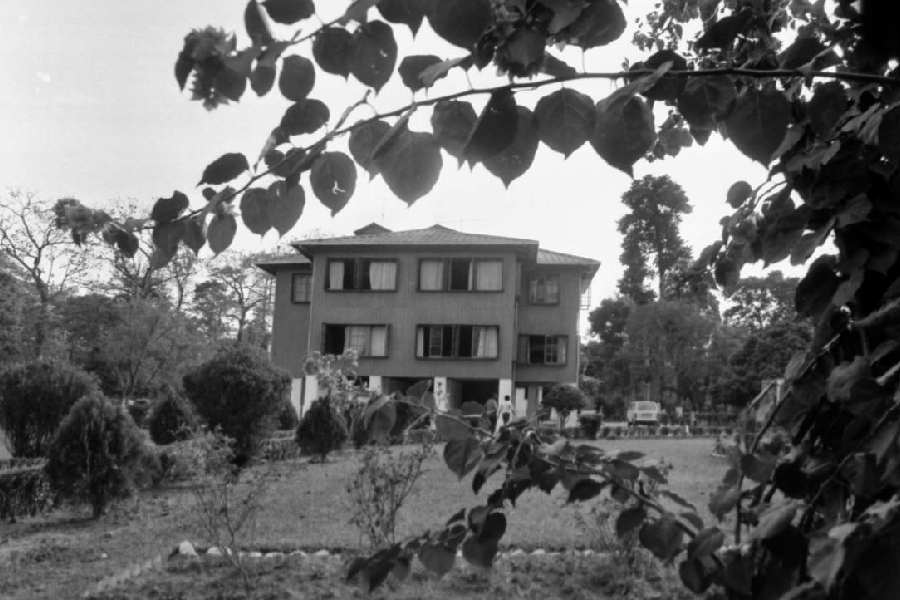The rats did it.
A report by the forest department of Bengal has stated that the fire that gutted Hollong, an iconic forest bungalow and a favourite destination of Bengali tourists — plebian and genteel — was apparently started by rodents. Rats, after all, are the Indian bureaucracy’s proverbial Nanda Ghosh (fall guy). From prising open confiscated liquor bottles under the nose of the Bihar Police to setting alight forest bungalows in Bengal, the mushik is, very much, the symbol of mischief.
In fact, rats and Hollong go back a long way. I should know a thing or two about that. For I was accused of sniffing around Hollong’s enchanting premises — rodent like — an aeon ago while visiting the tourist lodge as a gangly adolescent.
One quiet, drowsy afternoon — a few weeks before Hollong was to shut its doors to visitors for the mating season during which Jaldapara’s denizens have a wild time in the wild, away from the prying eyes of tourists — I found myself in front of a locked room on the floor from which one could, with a long-lensed binocular fixed to the eye, gaze at animals gathered at a salt lick on the opposite side of a stream that gurgled past the bungalow. I stood wondering whether the lock could give way to some unethical pressure when I was startled by a voice from behind me.
It said, conspiratorially but with gravitas, “Ekhane ele uni ei ghor ta tei thaken.”
It turned out that one of Hollong’s attendants, an ageing fellow but with hawk-like vision, had been keeping an eye on me as I went about my rat-like explorations. I felt his cold gaze wash over me and, after what appeared like an eternity, he seemed to have assured himself that I, my rat-like curiosity notwithstanding, was a benign entity; so he went on to spill a few beans. The “uni”, it turned out, was none other than the then serving chief minister, Jyoti Basu. Word was that he might set foot in Hollong in a few days.
I half expected to see red festoons being hung from the walls near the locked room in the next few days. Or that a hammer and a sickle would dangle from the roof overhead. But no, there was only the stuffed deer head with a startled look on its countenance, as if it had spotted the approaching bullet, with a coin-sized hollow adorning its forehead.
The hammer and the sickle may not have been there to greet Jyotibabu but there, at least, were the stars — millions of them. Those days, Hollong would not have electricity consistently and urban creatures, myself included, would troop gingerly, careful not to step on geckos — another species that shared the bungalow with the rats — to those parts of the building that offered scintillating views of the jungle night. Once there, we would be mesmerised by the luminous, but mellow, cosmic light that would trickle down from the skies on moonless nights. On the nights the moon decided to blossom, like one of Jaldapara’s strange, mesmerising flowers, the forest would lie still, bathed in silver radiance. Terra firma, on the other hand, would be aglow with muted, blinking, amber lights — the eyeshine of deer, elephants, wild boar, and the occasional leopard that came to the salt lick.
There were other, equally magical, experiences on Hollong’s menu. And it began from the beginning itself — the drive along the snaking road to the bungalow from the entrance gate next to which you could spot, in the gathering dusk, the occasional grazing deer or birds with bright plumage flitting from one tree to another. There was a bridge across the stream, the one that snaked past Hollong, that had to be crossed; but when we reached there, the bridge was gone, smashed by a herd of hungry elephants. So we had to walk on water, quite literally, to reach our destination, only to be told not to put the fruit bowl next to the window lest the elephants returned for a snack. An enclosure for kunkis — tamed pachyderms that took tourists inside the jungle — the jungle safaris on elephant-back at the crack of a chilly dawn, long walks along the forest road covered with dry leaves, quiet evenings next to the stream glistening with light from the fireflies, a yummy rice pudding dessert… Hollong knew how to take care of its guests.
But the spell, as is the case with all magic, was broken.
One morning, we were informed by that wizened, watchful attendant that most parts of Hollong, including the open space to spot animals, would be out of bounds for tourists. Reason? Uni — Jyoti Basu — was on his way. There was a polite request not to make our inconvenience public.
Did I, by penning this piece, just rat out the man three decades later?











